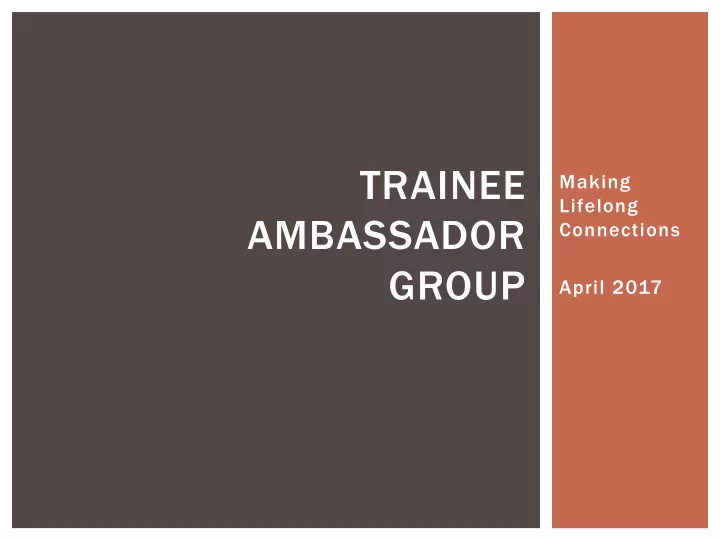

TRAINEE Making Lifelong AMBASSADOR Connections GROUP April 2017
WELCOME Holly Hodges Michelle Gin Yuka Asada Poll #1: How far did you travel from to be here?
OVERVIEW Trainee Ambassador Group (TAG) purpose and overview TAG Mentoring Initiative and Polling Mentoring Initiative Website Walk Through
WHAT IS THE TAG? TRA RAINEE EE A AMB MBASS ASSAD ADOR G GROUP UP Launched in 2015 Supported by the MCHB Division of MCH Workforce Development Goal: Develop current and future generations of leaders Poll #2: What is the goal of the TAG?
WHO ARE THE TAG MEMBERS? Ap Applicat cation on an and Select ction P Proces cess
WHAT DO TAG MEMBERS DO? 2016: V VID IDEO O Mem Member Res espon onsib ibil ilities Goa Goals ls lea lead t to o acco comp mplish shments! s!!! 2017: Monthly ‘ ‘Time wi me with T TAG’ Spotlight Up n next xt: Me Mentoring I Initiative
MENTORING INITIATIVE Goa Goal Learning through collaboration Please note: The mentoring initiative is in the early stages of development and is constantly evolving. Information presented on the following slides may be out of date or inaccurate if you are viewing the slides after April 2017.
MENTORING INITIATIVE Pu Purpose ose Facilitate connections between current and former trainees Improve collaboration and communication among trainees within and across training programs
MENTORING INITIATIVE Overvi view A virtual place for MCHB Trainees (current and former) as well as faculty and staff related to MCHB training programs to support one another Expanded network outside of one’s host site and niche Tips for positive mentoring relationships i.e. Suggest 1 year commitment but mentors & mentees can determine what works best for them Opportunity for peer mentorship and interdisciplinary mentorship
MENTORING INITIATIVE Database search options Training program Year completed traineeship Graduate Institution Current organization Current position title Location (city, state) What type of meeting are you willing to participate in (in- person; virtual; mixed) Contact information Area(s) of interest
MENTORING INITIATIVE Where in the process are we now?
WEBSITE WALK THROUGH
TAG CONTACTS FOR ADDITIONAL Julia Fantacone INFORMATION ABOUT MCH- THE TAG VISIT: TRC@altar um.org MCHB.HRSA.GOV/TRAINING/TR_AMB Claudia ASSADORS.ASP Brown CBrown4@ hrsa.gov
Trainee Ambassador Group MLC 17 Plenary Session Survey Report The MLC 17 Plenary Session Survey was completed by 56 attendees. 52 respondents (92 percent) completed the survey via mobile device. After learning about the Mentoring Initiative today, are you planning to participate as a mentor/mentee? 28 respondents (49 percent) responded yes. When asked why they plan to participant, responses included: Looking for opportunities to enhance my knowledge base - Value personal and professional mentorship - Want to give back - Looking back, I wish I had mentor when first starting my program - Great opportunity to stay professionally connected - Seeking support and guidance about my career path - Mentorship is a critical part of leadership - Valuable benefit of being part of the MCH training program “family” - Way to foster connections - Way to grow as a leader - Way to meet new people and potential collaborators - Way to stay professionally connected with MCH leaders - 11 respondents (19 percent) would not participate at this time and 18 respondents (32 percent) were unsure. When asked why they would not participate, responses included: Already having mentors and mentees - Lack of time - Too many other commitments - Unsure of expectations - Unsure if it will be structured enough - Unsure of the role I could play - When seeking a mentor, what is the best way to filter potential matches? Are there other methods that you use to filter potential matches when seeking a mentor? Areas the mentor is willing to assist with (interview prep, resume editing, job coaching, - management skills) Career type (government, academia, non-profit, NGO) - Credentials - Compatibility factors (are they a morning person, can you talk with them easily, personality - type, shared minority background) April 2017 Page 1
Trainee Ambassador Group MLC 17 Plenary Session Survey Report What’s the best way to recruit mentors? Are there other methods for recruiting mentors? Professional organizations for each discipline - Direct outreach to target mentors (post-doc and DrPH candidates) - MCH-related conferences (AMCHP, CityMatch, AUCD) - Meetings or events hosted by and for trainees - Training program directors and faculty - What’s the best way to inform current trainees? What other methods can the TAG use to inform current trainees? Training program directors and faculty - Regional leaders or program leaders discussing during class or meetings - Inform at the start of the traineeship - Posters for clinics - Conference sessions or tabling - University volunteer fairs - University communications - Are you interested in a LinkedIn group for current and former MCH trainees to network? 30 respondents (54 percent) answered yes. - April 2017 Page 2
Recommend
More recommend